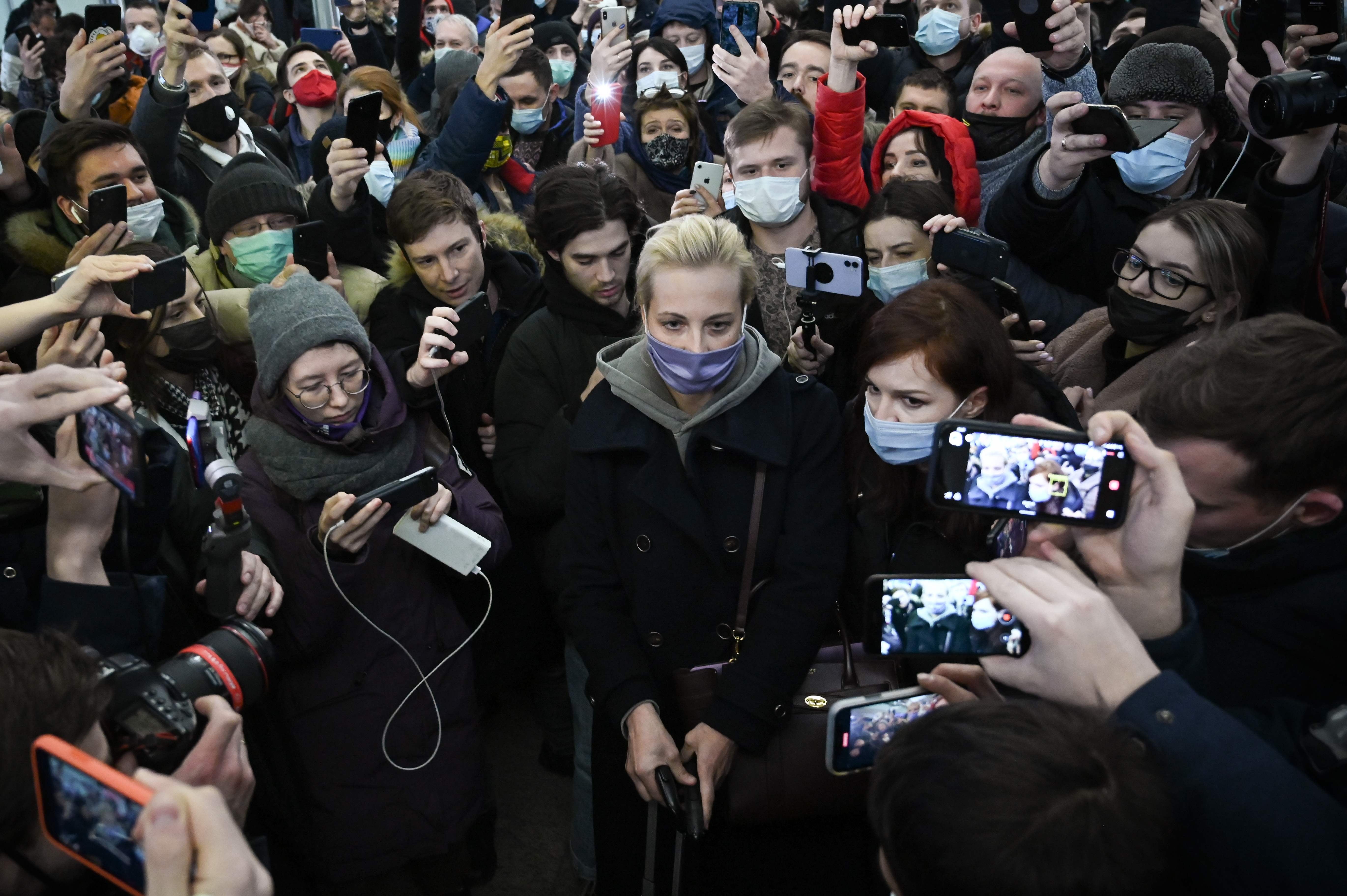First Lady: Russia warms to the woman who ‘saved’ Alexei Navalny
As her husband’s challenge to Putin’s rule grows, so does the public profile of Yulia Navalnaya, reports Oliver Carroll in Moscow


It was an image that crystallised last weekend’s news. Yulia Navalnaya, the tall, blonde 44-year-old wife of Russia’s most prominent opposition leader, embracing her husband at border control in a moment of cruelty and tenderness. The two had come home understanding the risks of returning to the lair of unsuccessful assassins – and the likelihood that a period of extended separation would follow.
To describe the chapters of the couple’s last five months as Shakespearean risks underselling the genre. To recap: first came the attack by a military-grade nerve agent. Then, the fortune of a quick thinking pilot and first responders. The agonising days of obfuscation by local bureaucrats. The drama of evacuation and the miracle of recovery. An investigation and a phone call that incriminated agents of the Kremlin.
Yet for many, it was exactly that; a Romeo and Juliet in Russian replay. Yulia Navalnaya’s impassioned defence of her man at every step along the way – from haranguing mendacious chief doctors to besieging Vladimir Putin to permit her husband’s evacuation – tugged at the emotions of many compatriots in ways they had not been before. Her ordinarily hard-shelled spouse was first among them. “Love heals and brings back to life,” Alexei wrote in a post-recovery ode. “Yulia, you saved me, and let them write that in the neuroscience textbooks.”
‘I’m not afraid’
If all those emotions weighed heavily on Ms Navalnaya’s mind on Sunday evening, she did well to conceal them. “I’m very happy you have come,” she told journalists soon after leaving her husband in the hands of his tormentors on the other side of arrivals. “The most important thing that Alexei said was that he isn’t afraid. I’m not afraid. And I ask you not to be afraid.”
Friends and colleagues of the trained economist describe her as smart and gutsy, a woman who has a way of staying cool in the most extreme circumstances. Being Alexei Navalny’s wife had brought with it a life of surveillance, harassment, prison trips, and financial difficulties, they said — in a way that she could not have imagined when the two met on a holiday romance in Turkey in 1998. On Saturday, she was even arrested herself as she took part in Moscow demonstrations calling for her husband’s release
Somehow she remained “committed” and “sane," they said. One close friend, who asked to remain anonymous, likened her to a “flint” capable of withstanding whatever fell on her. “She manages to maintain the most normal family life,” she said. “It’s remarkable.”
Yevgenia Albats, a well-known editor and academic close to the Navalnys, described the couple as an inseparable political double act. “Alexei is always public, but I do not doubt he discusses each of his steps with Yulia in every detail,” she said. “Yulia is his life coach. She makes him better. His entire life has been about seeking her approval first and foremost.”
Albats was an early champion of the opposition leader, identifying Navalny as a politician worth watching right at the start of his career. Beginning in 2004, she invited him to her home for weekly chats alongside other “young, democratically minded politicians”. Already, there was no denying his talent, she said, but seeing him opposite Yulia at a birthday party in a Moscow restaurant completed the picture.
“I watched two of them dancing, and thought it would take something for Alexei to prove he is worth that beautiful woman,” she recalled. The two were in love – that much was clear – but he would have to “be the best” to earn her respect in the long term: “Yulia stayed out of the crowd, a little bit detached from everyone. I called her the Snow Queen.”
Vladimir Ashurkov, a key member of Navalny’s high table, described Yulia as the “pillar” on which Navalny stands. He couldn’t remember a time when she doubted her husband’s decisions or judgement, he said, even though they often impacted her and her family in “the most direct way”. At the same time, Yulia Navalnaya was “no-one’s fool” and was at least as complicated as her husband.
The “multidimensional” woman was perhaps best understood by a picture the couple have framed in their Moscow apartment, Ashurkov offered: “It’s one of Yulia sitting down on the floor next to this big duffel bag she’s prepared for her husband in prison. She has this quizzical look – puzzled, frowning – and that sums her up better than any single sentence.”
As far as Yulia’s politics are concerned, a family friend said the two were so close – a “double headed eagle” – that their opinions were almost interchangeable: “They share the same passions,” the friend said. In a recent interview, Navalnaya herself said the couple’s bond had been reinforced by shared politics. “The chemistry we have is all about the excesses we’ve faced in our predicament,” she said. “I absolutely support what Alexei does and I think that it wouldn’t be cool if he quit half way.”
Political ambitions
Yulia Navalnaya’s now public courage and charisma have fuelled discussions about how she might need to step forward as a political figure in her own right. The increasingly radical mood of Kremlin camps suggests they may try to lock her husband away for some time – according to one report, for as long as 13 years. Perhaps, one logic goes, Yulia might be tempted to follow the example of Svetlana Tikhanovskaya, who ran against her husband’s authoritarian jailer next door in Belarus – and probably won by a landslide.
It wouldn’t be the first time in history that the idea of a Yulia Navalnaya candidacy has come up. It was previously touted by Kseniya Sobchak, a liberal socialite who, unlike Navalny, was allowed to stand against Vladimir Putin in 2018. (According to one media investigation, sent as a democratic spoiler candidate from the Kremlin.) Navalny insiders admit the idea was considered, before being rejected. “Votes aren’t transferable,” Alexei Navalny said at the time.
Sobchak told The Independent she proposed the idea for two reasons. First it solved the issue of a unified opposition candidate. “We needed someone who could run, and that meant without criminal convictions, however fabricated.” But it was also a matter of character. Yulia was “more attractive to a wider electorate,” Sobchak said. She had the right surname, but was “more reasonable, more adept at compromise, less categorical and cut-throat”.
Sobchak, who maintains Yulia Navalnaya still has the potential to become a unity figure for the country, said the “intransigence” of both Putin and Navalny now meant bloody revolutionary scenarios were now the more likely.
Those in the Navalny camp barely contain animosity for a woman they consider to be in cahoots with the Kremlin. The idea of Yulia Navalnaya becoming a “more acceptable” candidate while her husband was in jail was “horses**t”, Ashurkov countered. “It’s not in her character and it’s not in his character. She doesn’t think it’s her place and she doesn’t have the politics. She supports Aleksey.”
Albats, who maintains the authorities will not dare to impose a lengthy sentence on the opposition’s de facto leader, also said Yulia Navalnaya would avoid the obvious “trap” of becoming a political figure in her husband’s absence. “Such a move would make her a competitor to Alexei, and that is the last thing she would ever want to do,” she said.
But while family friends agreed Yulia was unlikely to go into politics out of choice, they also said she was more than capable of pulling it off if it was ever asked of her. “I’m reminded of the figure of Eleanor Roosevelt,” one said. “If everything is OK, if Alexei is functioning and if he isn’t in prison, or otherwise cut off from reality, then she isn’t going to start politicking on his behalf. But you do have this feeling that she could pick up the banner were it ever to fall.”
For the moment, the source continued, the only role Yulia was currently measuring for herself was that of an American-style First Lady. She is the “Michelle to Barack Obama,” but somehow transplanted into Russia, a country better known for autocracy and Novichok.
“It’s as if both of them are already living in a dreamy Russia of the future,” the friend said. “It sounds absolutely crazy, but for them it seems like it’s the absolute reality.”




Join our commenting forum
Join thought-provoking conversations, follow other Independent readers and see their replies
Comments